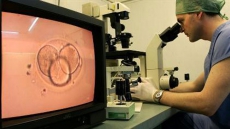TORONTO — Canadian researchers have developed a genetic test to identify which men are at highest risk for recurrence of prostate cancer following localized treatment with surgery or radiation therapy.
The genetic test provides a quick and highly accurate tool to determine which men with prostate cancer would do well with only surgery or radiation, and those who would need additional treatment — chemotherapy and hormone therapy, say the researchers, whose findings are described in Wednesday's online edition of the journal Lancet Oncology.
"Our findings set the stage to tackle the ongoing clinical problem of under-treating men with aggressive disease that will recur in 30 per cent to 50 per cent of patients due to hidden, microscopic disease that is already outside the prostate gland during initial treatment," said Dr. Robert Bristow, a clinician-scientist at Princess Margaret Cancer Centre in Toronto.
"This genetic test could increase cure rates in intermediate- to high-risk men by preventing progression to this metastatic spread of prostate cancer," said Bristow, who co-led the study with Dr. Paul Boutros, a scientist at the Ontario Institute for Cancer Research.
The predictive test analyzes biopsy tissue taken before treatment even starts to identify abnormal genetic characteristics in the tumour and its oxygen content. Low oxygen, known as hypoxia, makes prostate cancer cells "leaner and meaner," giving them the ability to invade blood vessels and spread throughout the body.
Together, this information can predict with almost 80 per cent accuracy which men with prostate cancer are at greatest risk of their disease returning in the form of secondary tumours outside the prostate, the study shows.
"The clinical potential is enormous for thousands of patients," said Bristow. "This is personalized cancer medicine to the hilt — the ability to provide more targeted treatment to patients based on their unique cancer genetic fingerprint plus what's going on in the cancer cell's surrounding environment. We hope to improve cure rates by reducing the chances of the cancer recurring and prevent the cells from spreading."
An estimated 23,600 Canadian men will be diagnosed this year with prostate cancer, the most common cancer diagnosed in men and the third leading cause of death from cancer. About 4,000 Canadians will die from the disease this year, according to Canadian Cancer Society statistics.
The researchers developed the genetic test with two groups of patients. In the first group, they analyzed DNA in biopsied cancer cells from 126 men who were treated with image-guided radiotherapy, monitoring them for an average of eight years. The test was also used in a second group of 150 men whose tumours were removed surgically.
The study showed that the men with the best outcomes — those who had a less than seven per cent recurrence of prostate cancer at five years — had low levels of genetic changes and little hypoxia. For men with high levels of genetic changes and high hypoxia, outcomes were worse — more than half had their cancer come back.
"Within this search, we found a distinct pattern of chromosome and gene changes that predicted early recurrence of prostate cancer, for example, within two years following local treatment," Bristow said in an email interview.
"The patients with this unique genetic signature had a 50 per cent chance of failing local treatment. These patients therefore need new intensified and personalized treatments to cure them. Once we validate our test, we will offer these patients novel treatments within future clinical trials."
Men who did not have the genetic signature did well with surgery or radiotherapy, so treatment would not change, he said.
The next step involves testing the genetic signatures of prostate tumours in hundreds of patients around the world over the next three years in order to validate the test as a predictive tool that could be used in the clinic. Currently, the test is in "research mode" only and not ready for use by doctors, Bristow said.
The research team hopes to have the test validated, approved by Health Canada and ready for use in five years, he said.
"We need to know who is at risk of having higher recurrence so we can personalize and change their treatment to improve the chance of cure. Without doing this, the likelihood of cure is only 50 per cent. But the test tells us who these patients are and therefore who needs intensified treatment. In the future, we'd love to move that cure rate from 50 per cent to 80 per cent or more with personalized treatment."




